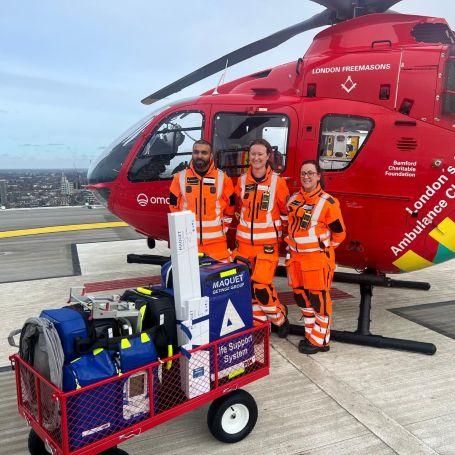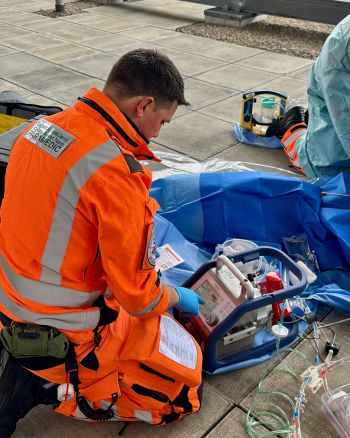6 May 2025

For the first time ever in the UK, London’s Air Ambulance is bringing ECMO to the streets of London, offering hope to patients in cardiac arrest.
Organisations from London’s health network have partnered to launch this groundbreaking Endovascular Cardiac Arrest Team (ECAT) – a pioneering new initiative designed to deliver cutting-edge care to patients experiencing medical cardiac arrest.
At present, no other air ambulance service in the UK has this capability, but early intervention for these patients is crucial to maximising the chances of survival.
The ECAT team can provide a vital intervention called extracorporeal membrane oxygenation (ECMO), which temporarily takes over heart function in patients who aren’t responding to standard resuscitation, securing them enough time for them to be transferred to a specialist cardiac centre for further treatment.
Whilst this is a UK first, trials elsewhere have indicated the improved outcomes of a reduced-time-to-intervention that an ECAT team will offer. In Minnesota an ECMO-ECPR team is dispatched to meet a paramedic team with an out-of-hospital cardiac arrest patient.
By reducing the time from arrest to ECMO-ECPR to less than 60 minutes, they’ve published good neurological survival of more than 40% of their patients.

Dr Ben Singer, who has led on the project for London’s Air Ambulance, explained: “Providing artificial heart support during cardiac arrest can make all the difference to patient outcomes, but not every patient can access that level of specialist support in time. This project can help level the playing field, offering a vital bridge for patients who do not respond to conventional resuscitation, giving them the best chance to reach specialist cardiac centres and get the care they need.
“This capability represents a major advancement in pre-hospital care and more broadly UK resuscitation medicine."
The team are dispatched by helicopter or rapid response car to patients across London and is another example of how London’s Air Ambulance Charity aims to be there when it is needed most, bringing hope to the scene for each of our patients.
This milestone is the result of a unique collaboration between London’s Air Ambulance Charity, London Ambulance Service and Barts Health NHS Trust, made possible through the generous support of funding partners Barts Charity, The Cranbrook Foundation, Geoff & Fiona Squire Foundation and Jude Morris Innovation and Development Fund.
Dr Tom Hurst, our Medical Director, said:
“This is a collaboration focused on one thing – creating an opportunity for survival where it has never been before. We’re under no illusions as to the scale of the challenge, but everyone at London’s Air Ambulance is confident that our clinical teams and their operational colleagues are equipped to meet it.
“It represents a hugely exciting step for London’s Air Ambulance Charity but we couldn’t do it alone – I’d like to thank all institutions involved in our ECPR Pathway and our funding partners at Getinge and Barts Charity, as well as our tripartite partners London Ambulance Service and Barts NHS Health Trust.”
Mark Faulkner, Consultant Paramedic for the London Ambulance Service, said: “Cardiac arrest survival rates in London have been static for over 10 years and we know it is a system approach that saves lives when a patient has a cardiac arrest. Immediate bystander life support is vital for every patient who is in cardiac arrest – things like chest compressions and prompt defibrillation are simple skills which anyone can learn, and can make all the difference.
“Where a patient does not respond to these interventions, ECAT provides an opportunity to enhance the care available on scene for patients and bring the care which has only been able to be delivered in a small number of hospitals to the scene.”
Dr Fenella Wrigley, Chief Medical Officer at London Ambulance Service, said: “Nothing like this has been delivered in the UK before and it is very exciting to work alongside our partners to improve outcomes for patients.
“When someone is in cardiac arrest, timing is everything. That is from giving immediate bystander chest compressions and a shock from a defibrillator to very advanced treatments like ECMO. The sooner ECMO can be started, a patient’s chance of survival rate is improved and their brain function outcome is better.”
Dr Andrew Wragg, Medical Director of St Bartholomew's Hospital, part of Barts Health NHS Trust, said: “We’re really proud to be part of this important partnership and to play a role in improving outcomes for cardiac arrest patients across London. The ECAT team forms a crucial link in the chain – acting as a bridge between first responders and specialist in-hospital care.
“By the time a patient reaches us at Barts Heart Centre, they’ve already been given the best possible chance. We hope the lessons from this pioneering service can be shared more widely to benefit patients across the UK.”

